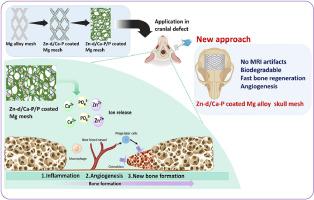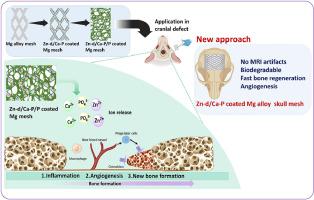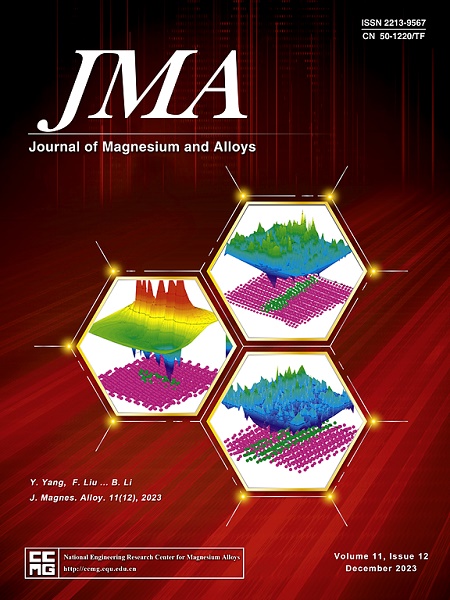Orchestrated degradation behavior of Mg mesh for calvarial bone defect reconstruction
IF 15.8
1区 材料科学
Q1 METALLURGY & METALLURGICAL ENGINEERING
引用次数: 0
Abstract
The biodegradability and biocompatibility of Mg alloys have rendered them favorable for cranial reconstruction applications. However, their rapid degradation rate has limited widespread use. In this study, we developed a Mg alloy -based mesh designed for calvarial bone defect reconstruction. We modulated the bone formation through the controlled degradation rate of the Mg alloy mesh. To achieve this, the Mg alloy mesh was coated with 2 types of coatings: Zn-d/Ca-P and Zn-d/Ca-P/P. Our findings revealed that, in comparison to the uncoated Mg alloy, both Zn-d/Ca-P and Zn-d/Ca-P/P coatings significantly reduced the degradation rate. The biocompatibility of the coated meshes improved markedly. With the Zn-d/Ca-P coating, there was not only an augmentation in the osteogenic potential of the Mg mesh but also an enhancement in angiogenic capacity. These meshed Mg samples were subsequently implanted into calvarial defects in rats. Bone regeneration was accelerated in specimens treated with Zn-d/Ca-P and Zn-d/Ca-P/P coatings compared to those with the bare Mg mesh. Furthermore, the in vivo assessments indicated that the coated meshes promoted angiogenesis. Nonetheless, the degradation rate of the Zn-d/Ca-P/P coating was slower than that of Zn-B/Ca-P. For applications requiring prolonged mechanical support, the Zn-d/Ca-P/P coating on Mg alloy is recommended, whereas the Zn-d/Ca-P coating is advisable for rapid regeneration where extended mechanical support is not critical.


用于腓骨缺损重建的镁网的协调降解行为
镁合金的生物可降解性和生物相容性使其成为颅骨重建的理想材料。然而,它们的快速降解率限制了其广泛应用。在这项研究中,我们开发了一种基于镁合金的网片,设计用于腓骨缺损重建。我们通过控制镁合金网的降解率来调节骨形成。为此,我们在镁合金网格上涂覆了两种涂层:Zn-d/Ca-P和Zn-d/Ca-P/P。我们的研究结果表明,与未涂层的镁合金相比,Zn-d/Ca-P 和 Zn-d/Ca-P/P 涂层都能显著降低降解率。涂层网格的生物相容性明显改善。Zn-d/Ca-P 涂层不仅增强了镁网的成骨潜力,还提高了血管生成能力。这些网格镁样品随后被植入大鼠的腓骨缺损处。与使用裸镁网格的样本相比,使用 Zn-d/Ca-P 和 Zn-d/Ca-P/P 涂层处理的样本的骨再生速度更快。此外,体内评估表明,涂层网格促进了血管生成。不过,Zn-d/Ca-P/P 涂层的降解速度比 Zn-B/Ca-P 慢。对于需要长时间机械支持的应用,建议在镁合金上使用 Zn-d/Ca-P/P 涂层,而对于不需要长时间机械支持的快速再生应用,则建议使用 Zn-d/Ca-P 涂层。
本文章由计算机程序翻译,如有差异,请以英文原文为准。
求助全文
约1分钟内获得全文
求助全文
来源期刊

Journal of Magnesium and Alloys
Engineering-Mechanics of Materials
CiteScore
20.20
自引率
14.80%
发文量
52
审稿时长
59 days
期刊介绍:
The Journal of Magnesium and Alloys serves as a global platform for both theoretical and experimental studies in magnesium science and engineering. It welcomes submissions investigating various scientific and engineering factors impacting the metallurgy, processing, microstructure, properties, and applications of magnesium and alloys. The journal covers all aspects of magnesium and alloy research, including raw materials, alloy casting, extrusion and deformation, corrosion and surface treatment, joining and machining, simulation and modeling, microstructure evolution and mechanical properties, new alloy development, magnesium-based composites, bio-materials and energy materials, applications, and recycling.
 求助内容:
求助内容: 应助结果提醒方式:
应助结果提醒方式:


